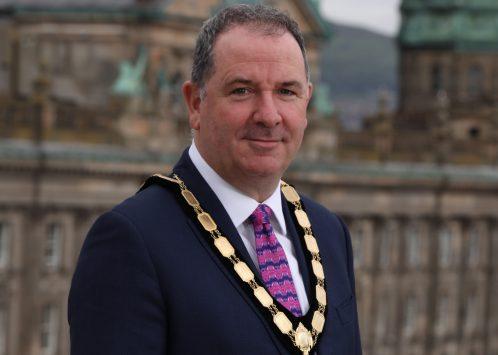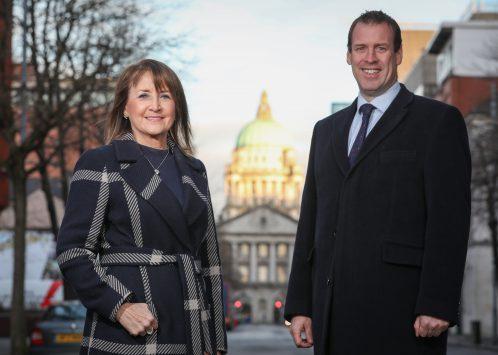Political stability, the completion of negotiations between UK Government and the EU, the upcoming review of education and the UK Government’s levelling up agenda will be vital to NI businesses in the year ahead.
This was the message from Northern Ireland Chamber of Commerce and Industry (NI Chamber) President Paul Murnaghan, who was speaking on behalf of the membership organisation which represents over 1,000 businesses employing in excess of 100,000 people.
Commenting on business priorities for the year ahead, Mr Murnaghan said: “After the seismic challenges of the past two years, businesses in every sector across Northern Ireland need 2022 to deliver certainty for all aspects of trade, support for continued recovery and the right conditions for sustainable growth.
“While a new year brings renewed optimism, for some sectors in particular, the difficulties of 2021 and 2020 have certainly not gone away. The arrival of the Omicron variant in December brought further uncertainty which has placed additional pressures on hospitality and tourism, just as they were finding their feet again.
“Many firms are still dealing with the compound impact of new trading arrangements, uncertainty around the Protocol, restrictions, supply-chain difficulties, transport delays/increased costs and labour shortages. So when we speak about approaching 2022 with optimism, we’re looking for opportunities in the long-term, without ignoring the reality of what it means to run a business in Northern Ireland during the present.”
On immediate support…
“It is becoming clearer that businesses are going to face a challenging start to the new year. Those hoping to return staff to offices in the interests of staff development and team working benefits, now have to shelve those plans. Universities have reverted to virtual teaching, much to the dismay of students and the hospitality sector is experiencing unprecedented cancellations. The latter needs sufficient support to compensate for the lack of business during this time.”
On stability and making business a priority…
“The need for political stability from our elected representatives cannot be overstated – businesses cannot trade with uncertainty. During a time of such unprecedented challenge, strong, stable devolved government is absolutely business critical.
“An Assembly election in May will see a new Executive formed. Whatever its make-up, it is vitally important that the next set of Ministers keep business and the economy front and centre.
“Business needs to be a priority because it plays a fundamental role in delivering for people and communities. So when we talk about business, we should not see it in a narrow, profit driven sense. It’s about people’s livelihoods and their sense of purpose and wellbeing, communities and families, as well as taxes to run vital public services and the country.”
On dealing with the skills crisis…
“Northern Ireland has had a skills shortage for decades, which has been exacerbated since the onset of the pandemic. Whilst the proportion of people in employment has risen consistently for six years, high levels of long-term economic inactivity remain.
“Some of the solutions might seem obvious. For example, we need to invest in languages and digital skills, increase apprenticeship numbers, deliver wrap-around support for people with no or low qualifications and develop a flexible and cost effective immigration system that ensures fast access to skills when they can’t be recruited locally. The problem is though, the required level of finance is not in place to deliver solutions to the skills problems we have.
“NI Chamber welcomed the Skills Strategy and supports the establishment of the Skills Council. But until appropriate funding is in place, change on the scale that we need simply won’t be achieved.”
On levelling up…
“Addressing Northern Ireland’s low levels of productivity is going to be crucial, both regionally, relative to the rest of the UK and in those parts of Northern Ireland where performance is particularly poor. Levelling up also means maximizing external and internal connectivity with high-quality physical and digital infrastructure. It means supporting infrastructure investment connected to Northern Ireland’s key strategic priorities, including the Energy Strategy, Green Growth Strategy and 10x Economy Vision among others.
“Finally and importantly, we need to see commitments to fully compensating the region for lost EU funding. Businesses need assurance that this funding will be safeguarded through UK replacement supports, including the Levelling Up Fund.”
On trade…
“Throughout the Brexit process, NI Chamber has been guided by members, almost 70% of which have told us they believe that Northern Ireland’s unique status now presents opportunities for the region. Recent announcements, such as Almac’s 1,800 jobs, are evidence of the unique opportunities of dual market access. It’s in that context of optimism that NI Chamber strongly encourages both the UK and EU to progress in the Northern Ireland Protocol talks, without triggering Article 16.
“There are still serious issues to be resolved. A recent survey of NI Chamber members showed that 84% of exporters have experienced an increase in the price of goods and services, while 89% have experienced an increase in the amount of time it takes to transport goods. At the same time, most also said they had plans to grow their business. In fact, 42% of NI businesses have plans to grow in EU markets, compared to 17% of UK businesses in total.
“If policy makers can resolve these issues quickly and in partnership with business, Northern Ireland finds itself at the starting blocks of a unique opportunity at a time when we really need it.”
On climate…
“After too many years of political inaction on climate change we now have two bills at different stages within our Assembly. They differ in the targets they set, and in the level of support or indeed opposition, they attract but progress is progress and it would be churlish not to acknowledge that we are better for having competing climate change bills than no legislation at all.
“Our policy makers should prioritise environmentally friendly projects that support the longer-term goal of decarbonisation. Strategic energy projects such as the North South Interconnector must be prioritised and delivered quickly. Decentralised working presents real opportunities to reduce our environmental impact, but also requires investment in high quality digital infrastructure and local public services.”
On infrastructure and planning…
“Northern Ireland has fallen behind its competitors on infrastructure investment. An all-island strategy that aligns with the Shared Island Fund announced by the Irish Government is required and should include roads, rail, air, sea, waste, digital and energy connectivity. As a society, we should focus on digitisation to support infrastructure development and prioritise major projects that deliver the greatest competitiveness enhancements for society.
“For example, investment in mobile and broadband infrastructure is essential to Northern Ireland’s competitiveness, while support for a transport system that reduces the negative impact of congestion and greenhouse gases on productivity and health is also strategically important.
“On planning, it is also vital that key strategic planning decisions move through the system at speed, if Northern Ireland is to keep up with peers nationally and internationally. There are projects in the system that can be ready for 2024/25, which will also support the 70% 2030 renewable electricity target.”
On health and education…
“Poor health, both physical and mental, impacts economic performance. We need to treat health as a previous national asset and hard decisions are required in order improve services. The recently announced multiyear budget could provide a catalyst to tackle the causes of physical and mental ill-health, where the whole of Government could deliver a much richer return than the sum of its constituent parts.
“If we are to really tackle the growing skills problem, we need to start at school level, amending the curriculum for subjects at all levels to include both ‘systems skills’ such as ICT, robotics, data analytics and coding, as well as ‘human skills’ like empathy and strategy. These skills are required for work in a more digitised and decentralised future.
“Currently, only 7% of our students benefit from an integrated education. The current Independent Review of Education is a real opportunity to ensure that every young person can benefit from a high-quality education which crucially, has reconciliation at its core.”
On NI Chamber’s commitment…
“The work that we do makes a real difference in the lives of businesses, communities and people across Northern Ireland. Over the course of the next year, the NI Chamber Board and Executive team reaffirms its absolute commitment to continue representing our members’ voices and supporting their growth ambitions.”


